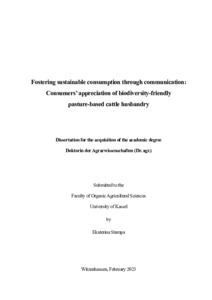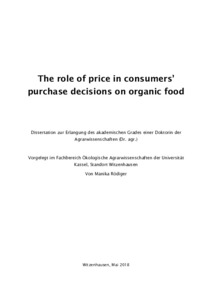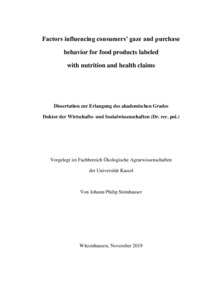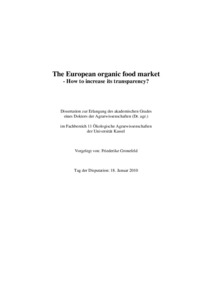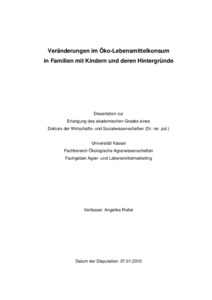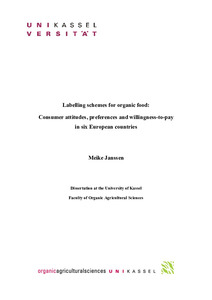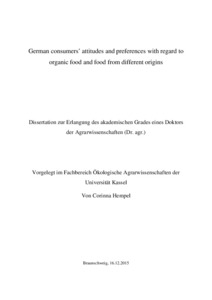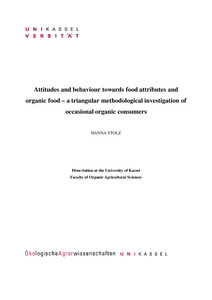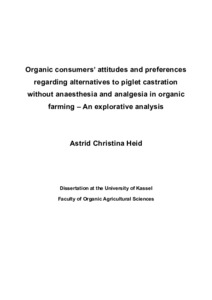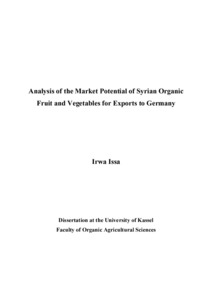Search
Now showing items 1-10 of 12
Dissertation

 Fostering sustainable consumption through communication: Consumers’ appreciation of biodiversity-friendly pasture-based cattle husbandry
Fostering sustainable consumption through communication: Consumers’ appreciation of biodiversity-friendly pasture-based cattle husbandry
(2024-01)
Considering dramatic environmental changes, there is an evident necessity of a transition to more sustainable animal production that caters to societal demand for ethical production and consumption. The slow but steady shift in consumer demand for animal-friendly, environmentally, and socially re-sponsible animal products has been well documented over the past years. The overarching goal of this dissertation is to provide insights regarding consumer perceptions, acceptance, preferences and com-munication of ...
Dissertation

 The role of price in consumers’ purchase decisions on organic food
The role of price in consumers’ purchase decisions on organic food
(2018-05)
Trotz des über die letzten Dekaden anhaltenden Wachstums des Marktes für ökologische Lebensmittel bleibt der Sektor hinter seinem Potential zurück. Als wesentlicher Grund hierfür wird häufig der Preis von Öko-Lebensmitteln genannt, der von Konsumenten als zu hoch empfunden wird. Der derzeitige Stand des Wissens bietet jedoch kein klares Bild über das Verbraucherverhalten in Bezug auf den Preis von Öko-Lebensmitteln. Das Ziel dieser Dissertation ist daher, Erkenntnisse zur Preissensitivität von Verbrauchern bei ...
Dissertation
 Factors influencing consumers’ gaze and purchase behavior for food products labeled with nutrition and health claims
Factors influencing consumers’ gaze and purchase behavior for food products labeled with nutrition and health claims
(2019-11)
Short Summary:
The labeling of food products with a nutrition or a health claim is a widespread practice in the EU. These claims are short sentences on the front of food packages which highlight positive nutritional characteristics or beneficial health effects for the body. Research on nutrition and health claims shows a lack of consensus on whether these claims have a positive or a negative effect on consumers’ preferences and purchase behavior. Therefore, the research objective of this dissertation was to investigate ...
Dissertation
 The European organic food market - how to increase its transparency?
The European organic food market - how to increase its transparency?
(2010-12-06)
Der Europäische Markt für ökologische Lebensmittel ist seit den 1990er Jahren stark gewachsen. Begünstigt wurde dies durch die Einführung der EU-Richtlinie 2092/91 zur Zertifizierung ökologischer Produkte und durch die Zahlung von Subventionen an umstellungswillige Landwirte. Diese Maßnahmen führten am Ende der 1990er Jahre für einige ökologische Produkte zu einem Überangebot auf europäischer Ebene. Die Verbrauchernachfrage stieg nicht in gleichem Maße wie das Angebot, und die Notwendigkeit für eine Verbesserung des ...
Dissertation
 Veränderungen im Öko-Lebensmittelkonsum in Familien mit Kindern und deren Hintergründe
Veränderungen im Öko-Lebensmittelkonsum in Familien mit Kindern und deren Hintergründe
(2010-02-17)
Im Rahmen der Arbeit wird den Fragen nachgegangen, inwiefern der Konsum von Öko-Lebensmitteln in Familien mit Kindern im zeitlichen Verlauf Veränderungen unterliegt und worin Veränderungen im Öko-Lebensmittelkonsum in Familien mit Kindern begründet sind. Aus den hierzu gewonnenen Erkenntnissen werden Schlussfolgerungen für die Konsumentenforschung und das Marketing von Öko-Produkten gezogen. Theoretische Grundlage stellen der Familienzyklus sowie Forschungsergebnisse zum Konsumentenverhalten in Familien und zum Konsum ...
Dissertation
 Labelling schemes for organic food: Consumer attitudes, preferences and willingness-to-pay in six European countries
Labelling schemes for organic food: Consumer attitudes, preferences and willingness-to-pay in six European countries
(2011-12-12)
Since July 2010, all pre-packed organic food produced in the European Union (EU) must carry the new mandatory EU logo for organic food. Voluntary organic labels (such as national governmental logos and logos of private farmers’ associations and control bodies) can still be used, but only in addition to the mandatory EU logo. This change in the regulatory environment of organic labelling raises a number of questions regarding consumer preferences for different kinds of organic certification logos, which the present ...
Dissertation
 German consumers' attitudes and preferences with regard to organic food and food from different origins
German consumers' attitudes and preferences with regard to organic food and food from different origins
(2016-06-23)
In dieser Studie geht es darum, ein umfassendes Bild bezüglich der Konsumenteneinstellungen, Präferenzen und Zahlungsbereitschaften für ökologisch produzierte Lebensmittel und Lebensmittel verschiedener Herkünfte in Deutschland zu erhalten. Obwohl die regionale Herkunft von Lebensmitteln nicht offiziell und einheitlich geregelt ist und keiner Zertifizierung unterliegt wie die ökologische Produktion von Lebensmitteln, zeigen nationale und internationale Studien gleichermaßen, dass Konsumenten bereit sind, mehr für ...
Dissertation
 Attitudes and behaviour towards food attributes and organic food – a triangular methodological investigation of occasional organic consumers
Attitudes and behaviour towards food attributes and organic food – a triangular methodological investigation of occasional organic consumers
(2012-01-04)
Organic food is increasingly available in the conventional food retail, where organic products are offered alongside with various other types of products and compete mainly with conventional and the so-called conventional-plus products. The latter are conventional products displaying particular quality attributes on the product packaging, such as ‘no artificial additives’, or ‘from animal welfare husbandry’. Often, these quality attributes also apply to organic products. Occasional organic consumers might prefer such ...
Dissertation
 Organic consumers' attitudes and preferences regarding alternatives to piglet castration without anaesthesia and analgesia in organic farming - an explorative analysis
Organic consumers' attitudes and preferences regarding alternatives to piglet castration without anaesthesia and analgesia in organic farming - an explorative analysis
(2013-11-05)
In Germany and other European countries piglets are routinely castrated in order to avoid the occurrence of boar taint, an off-flavour and off-odour of pork. Sensory perception of boar taint varies; however, it is regarded as very unpleasant by many people. Surgical castration which is an effective means against boar taint has commonly been performed without anaesthesia or analgesia within the piglets’ first seven days of life. Piglet castration without anaesthesia has been heavily criticised, as the assumption that ...
Dissertation
 Analysis of the Market Potential of Syrian Organic Fruit and Vegetables for Exports to Germany
Analysis of the Market Potential of Syrian Organic Fruit and Vegetables for Exports to Germany
(2016-10-19)
Syria has been a major producer and exporter of fresh fruit and vegetables (FFV) in the Arabic region. Prior to 2011, Syrian FFV were mainly exported to the neighbouring countries, the Gulf States and Northern Africa as well as to Eastern European countries. Although the EU is potentially one of the most profitable markets of high quality FFV (such as organic ones) in the world, Syrian exports of FFV to Western European countries like Germany have been small. It could be a lucrative opportunity for Syrian growers and ...

